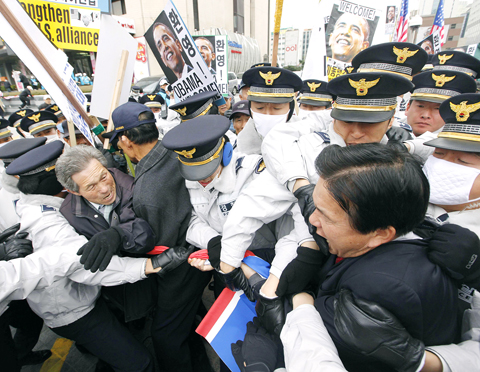US President Barack Obama issued a strong warning to Iran yesterday of consequences of its failure to respond to the offer of a nuclear deal and could have a package of steps to take “within weeks.”
Iran’s foreign minister, however, rejected talk of further sanctions, saying the West had learned from “failed experiences” of the past.
Iran on Wednesday rejected a deal to send enriched uranium abroad for further processing, defying Washington and its allies, which had called on Tehran to accept a deal aimed at delaying Iran’s potential ability to make bombs by at least a year by divesting the country of most of its enriched uranium.

PHOTO: REUTERS
The UN nuclear watchdog, the International Atomic Energy Agency (IAEA), had said Iran should send 75 percent of its low-enriched uranium to Russia and France, where it would be turned into fuel for a Tehran medical research reactor.
“Iran has taken weeks now and has not shown its willingness to say ‘yes’ to this proposal ... and so as a consequence we have begun discussions with our international partners about the importance of having consequences,” Obama said at a joint news conference with South Korean President Lee Myung-bak during a visit to Seoul.
He said Iran would not be given an unlimited amount of time, likening the Iranian nuclear issue to the years of stop-and-start negotiations with North Korea about its nuclear ambitions.
“We weren’t going to duplicate what has happened with North Korea, in which talks just continue forever without any actual resolution to the issue,” said Obama, who has advocated a policy of increased engagement, rather than confrontation, on thorny international issues.
In Manila, visiting Iranian Foreign Minister Manouchehr Mottaki dismissed the possibility of further sanctions.
“Sanction was the literature of the 60s and 70s,” he said at a news conference. “I think they are wise enough not to repeat failed experiences,” he said, speaking through an interpreter. “Of course it’s totally up to them.”
Mottaki said Tehran was willing to discuss the plutonium deal, but only if the swap of enriched uranium for nuclear fuel took place within Iran.
“Iran raises its readiness in order to have further talks within the framework which is presented,” he said.
“It’s not our proposal to have a swap,” he said. “They raised such a proposal and we described and talked about how it could be operationalized.”
Obama said he still hoped Iran would change its mind and that the US and its allies would consider a package of potential steps to indicate to Iran their seriousness.
“Our expectation is that, over the next several weeks, we will be developing a package of potential steps that we could take, that would indicate our seriousness to Iran,” he said.
Meanwhile, the French Foreign Ministry yesterday rejected Iran’s request for more talks to
explore the technical details of a plan to provide fuel for its
reactors.
Foreign ministry spokesman Bernard Valero said dialogue could
continue on Tehran’s nuclear program, but “it will
not touch on the technical issues.
Also See: 9/11 plotter will be convicted: Obama

TRAGEDY STRIKES TAIPEI: The suspect died after falling off a building after he threw smoke grenades into Taipei Main Station and went on a killing spree in Zhongshan A 27-year-old suspect allegedly threw smoke grenades in Taipei Main Station and then proceeded to Zhongshan MRT Station in a random killing spree that resulted in the death of the suspect and two other civilians, and seven injured, including one in critical condition, as of press time last night. The suspect, identified as a man surnamed Chang Wen (張文), allegedly began the attack at Taipei Main Station, the Taipei Fire Department said, adding that it received a report at 5:24pm that smoke grenades had been thrown in the station. One man in his 50s was rushed to hospital after a cardiac arrest

SAFETY FIRST: Double the number of police were deployed at the Taipei Marathon, while other cities released plans to bolster public event safety Authorities across Taiwan have stepped up security measures ahead of Christmas and New Year events, following a knife and smoke bomb attack in Taipei on Friday that left four people dead and 11 injured. In a bid to prevent potential copycat incidents, police deployments have been expanded for large gatherings, transport hubs, and other crowded public spaces, according to official statements from police and city authorities. Taipei Mayor Chiang Wan-an (蔣萬安) said the city has “comprehensively raised security readiness” in crowded areas, increased police deployments with armed officers, and intensified patrols during weekends and nighttime hours. For large-scale events, security checkpoints and explosives

A car bomb killed a senior Russian general in southern Moscow yesterday morning, the latest high-profile army figure to be blown up in a blast that came just hours after Russian and Ukrainian delegates held separate talks in Miami on a plan to end the war. Kyiv has not commented on the incident, but Russian investigators said they were probing whether the blast was “linked” to “Ukrainian special forces.” The attack was similar to other assassinations of generals and pro-war figures that have either been claimed, or are widely believed to have been orchestrated, by Ukraine. Russian Lieutenant General Fanil Sarvarov, 56, head

PUBLIC SAFETY: The premier said that security would be tightened in transport hubs, while President Lai commended the public for their bravery The government is to deploy more police, including rapid response units, in crowded public areas to ensure a swift response to any threats, President William Lai (賴清德) said yesterday after a knife attack killed three people and injured 11 in Taipei the previous day. Lai made the remarks following a briefing by the National Police Agency on the progress of the investigation, saying that the attack underscored the importance of cooperation in public security between the central and local governments. The attack unfolded in the early evening on Friday around Taipei Main Station’s M7 exit and later near the Taipei MRT’s Zhongshan